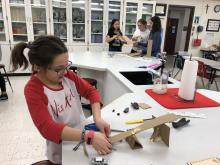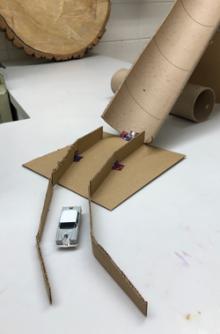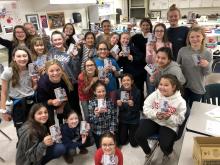“Whoa, do you think our Ewy will go as fast on our race track as she did during the race?” “I don’t know! I just hope she doesn’t crash!”
Cardboard tubes and sheets, along with a wide variety of colored duct tape littered both my classroom and the small gym at our school. It was the day of our “No Limits Design Challenge” and students in grades 3 – 8 were busy using their best engineering and design skills to build cardboard race tracks for a small Matchbox car. But this wasn’t just any car. This was car number 711. A replica of Ewy Rosqvist’s champion Mercedes Benz race car. A car that won the 1962 Argentinian Grand Prix and made history on multiple accounts; with a driver who proved that women could do anything men could do, and in this case, do it faster. Setting a speed record of 126 km/hr. and crossing the finish line three hours ahead of any of her competitors, Ewy Rosqvist said, “They said I could never finish, so I finished first.”

But let’s back up a minute, what does duct tape and cardboard have to do with a legendary race car driver? Well you see, once a month my classroom transforms itself from a middle-school science room into an engineering and design studio, as students turn their sketches into reality during our engineering and design challenges. From planks on pirate ships, to humanitarian aid drops; students come to class excited, ready to fail, (and hopefully fail quickly!), as they turn their drawings into creations using teamwork and the engineering and design process.
This past January thanks to a grant from the National Girls Collaborative Project, Mercedes Benz, and Mattel, we were able to expand what happens monthly in our middle-school to include our lower-school friends from across the hall in a design challenge of historic proportions. Historic, because before cardboard and colorful duct tape was strewn all over my room and the small gym, all of our students (about 140 in all); from the co-ed classrooms of grades 3-5, to the all-girls classrooms of grades 6-8, gained a new role model in Ewy Rosqvist, a woman who challenged stereotypes and followed her dreams. A race car driver who taught students about tenacity, perseverance, and why it’s important to believe in themselves.

As Ewy rocketed across the finish line in the black and white film, “An Unexpected Champion,” students eyes widened. As she spoke her famous line about finishing first, some tears were visible, mainly in my eyes; and as students broke out into teams, they harnessed their inner Ewy, their excitement and ingenuity and got to work.
Students transformed themselves into part pit crew, part engineering design team, as they built mini race circuits. Car 711 and Ewy had to get safely around one of three challenges; a lake, a steep curve, or a mountain. With only thirty minutes of build time, and a limited amount of supplies, students got to work. Their meters worth of colored duct tape was carefully rationed, and the cardboard race tracks began to come alive. When the end of build time was called ecstatic cheers filled the air as students raced around testing their cars on a wide variety of ramps, tunnels, and curves. One student remarked, “There are no limits to my dreams!”
Finding people to look up to may be one of the most important things we can do to help our students actualize their potential. Role models, like Ewy Rosqvist, inspire us to keep going; even when people doubt us, even when people tell us we are not worth the investment, even when, and especially, they tell us we will never finish. When students look at Ewy Rosqvist and all she has accomplished, they are reminded to never lose sight of their dreams and aspirations.

After we had tested all of the tracks and picked up our stations, I asked students to reflect on why it is important to challenge stereotypes. The following is a sample from my 6th grade science class:
- “Because if we don’t, we will never know what our limit really is.”
- “It’s important because you need to learn you can do anything.”
- “There are a lot of stereotypes about women that we must prove are wrong.”
- “To not challenge stereotypes means accepting that you are powerless.”
- “We are just as smart as the boys, and people need to see that.”
- And finally, “It’s up to us to change the thoughts in people’s heads. Just because you are a different gender doesn’t mean anything about your skills!”
The cars that each student brought home will hopefully remind them of all they learned as they put pineapple duct tape to cardboard tube. After all, students learned more than just how to build a successful race track, they learned that toys, like their dreams, have no limits.

Caroline Little
Caroline Little teaches middle-school science and engineering at Visitation School, an all-girls school for grades 6-12 and co-ed school for Montessori-5, in Mendota Heights, Minnesota. A National Geographic Certified Educator and DiscoverE Girl Day Role Model, Caroline is passionate about inspiring her students both in and out of the classroom; helping them harness an explorer mindset to become agents of change.